As a BetterHelp affiliate, we receive compensation from BetterHelp if you purchase products or services through the links provided
Deep sleep, a crucial sleep cycle phase, is essential to our overall health and well-being. During this stage, the body repairs, consolidates memory, and rejuvenates. However, many of us struggle to achieve sufficient deep sleep, leading to many health issues.
This guide aims to demystify the concept of deep sleep, exploring its importance, how it affects our health, and practical strategies to increase the quality and quantity of deep sleep. Whether you want to improve cognitive function, boost your immune system, or feel more rested, understanding and optimizing your deep sleep could be the key.
What is Deep Sleep, and Why Does it Matter?
Deep sleep is the most vital phase of our sleep cycle, a crucial time when the body repairs and consolidates memories. Acknowledging its role underlines the importance of quality shut-eye for overall health and well-being.
Stages of Sleep
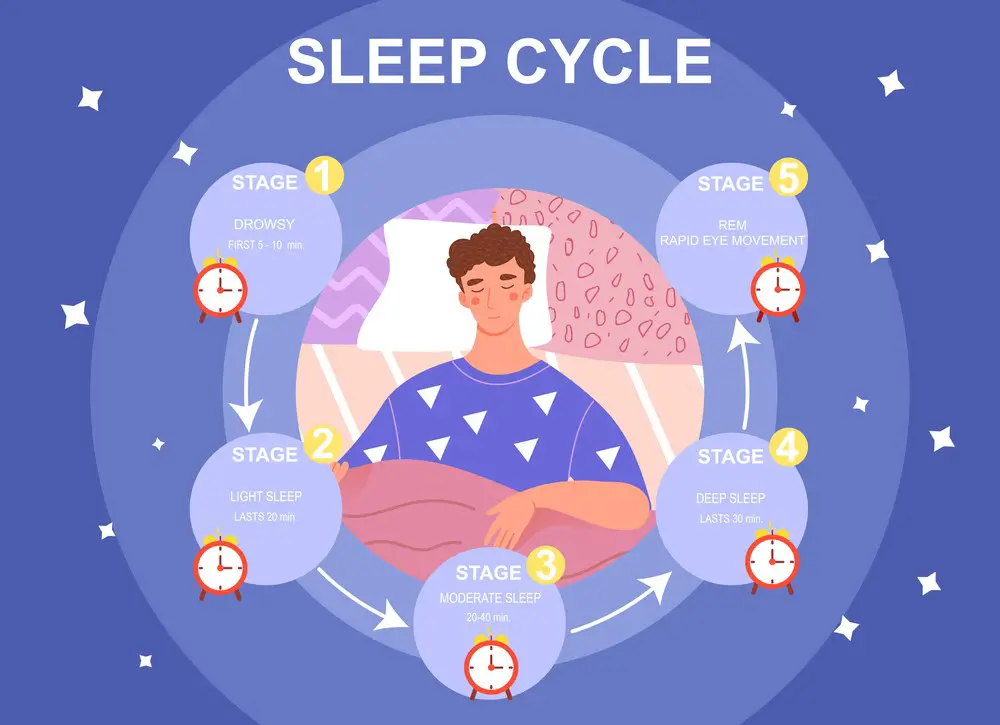 Sleep is categorized into two main types: non-REM and REM. Non-REM sleep progresses through three distinct stages.
Sleep is categorized into two main types: non-REM and REM. Non-REM sleep progresses through three distinct stages.
Stage one is considered light sleep, where your body starts to relax physiologically, such as your muscles loosening and heart rate slowing. Stage two marks the onset of actual sleep patterns like rapid eye movement and slowed brain waves. Stage three is the deepest, most restorative sleep, known as “slow wave” sleep.
REM or rapid eye movement sleep generally occurs in the second half of your sleep. This phase features quick, random movements of the eyes along with dreaming, fluctuating breathing rates, and paralysis of the limbs and body. REM is critical for memory consolidation and learning skills.
Each sleep cycle lasts around 90 minutes as you move between non-REM and REM sleep states. Getting ample time in deep, slow-wave sleep and vivid REM allows you to recharge energy levels and wake feeling well-rested.
Benefits of Deep Sleep
Deep sleep triggers the body’s repair processes. This is when tissues grow back stronger, bone and muscle develop, and your immune system gets a boost. During this stage of the NREM sleep cycle, growth hormone circulates in your bloodstream, facilitating all these vital functions efficiently.
This vital phase also plays a pivotal role in memory consolidation. Your brain purges irrelevant information and secures new memories after a day of learning and experiences.
Cognitive function improves as deep sleep helps to clear your mind for the next day’s challenges.
How Much Deep Sleep Do You Need?
Understanding the right amount of deep sleep is crucial for your body’s recovery and overall health, as it varies across different age groups and individual needs. Digging into what science says about this vital phase can help unlock the secrets to a better night’s rest.
Recommended Sleep Duration By Age Group
Knowing how much sleep you need can be a key to better rest. The National Sleep Foundation has outlined recommended sleep durations for different age groups to ensure individuals get enough deep sleep for optimal health.
| Age Group | Recommended Sleep Duration |
| Newborns (0-3 months) | 14-17 hours |
| Infants (4-11 months) | 12-15 hours |
| Toddlers (1-2 years) | 11-14 hours |
| Preschoolers (3-5 years) | 10-13 hours |
| School-age children (6-13 years) | 9-11 hours |
| Teenagers (14-17 years) | 8-10 hours |
| Young adults (18-25 years) | 7-9 hours |
| Adults (26-64 years) | 7-9 hours |
| Older adults (65+ years) | 7-8 hours |
Babies and children need significant deep sleep, with stage 3 making up about 25% of their total sleep time. Adults, including older adults, typically require seven to nine hours of sleep, though deep sleep decreases with age.
What Is Core Sleep?
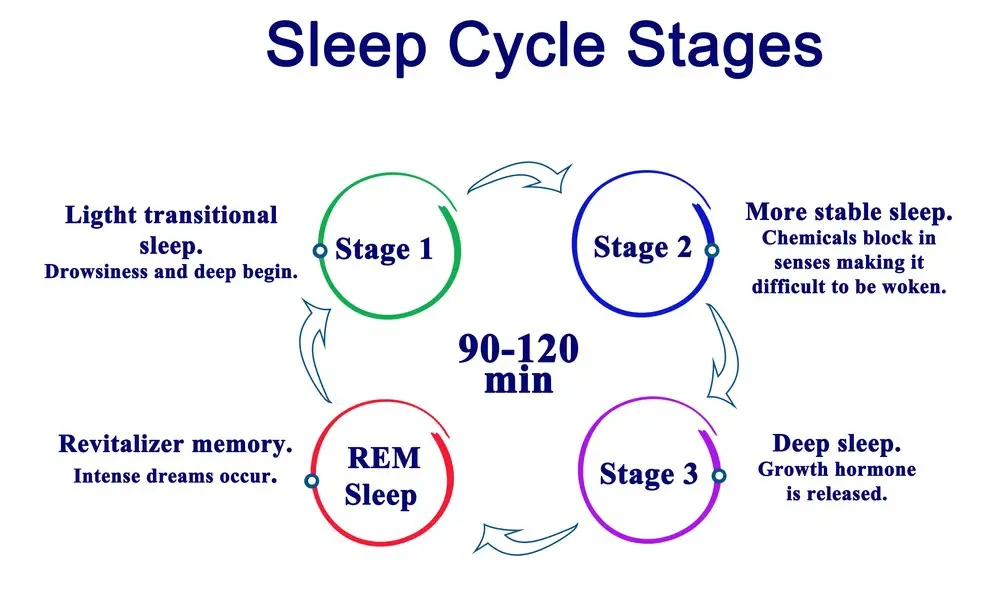
Core sleep represents the most essential part of our sleep cycle, encompassing the deep, restorative stages that our bodies and minds require to function optimally. This critical sleep period is when the most intense restoration occurs, making it fundamental to our health and well-being.
Understanding Core Sleep
Core sleep includes the third stage of non-REM sleep, often called deep or slow-wave sleep, and the initial stages that prepare our body to enter this vital phase. Although REM sleep is crucial for memory consolidation and emotional regulation, core sleep focuses on our sleep cycle’s physical rejuvenation and recovery.
The Significance of Core Sleep
The importance of core sleep cannot be overstated. During this time, the body undergoes significant repair and recovery processes. These include muscle growth, tissue repair, protein synthesis, and the release of growth hormones essential for overall health.
Core sleep also plays a pivotal role in immune system functioning, helping to bolster our defense against illness and stress.
For cognitive functions, core sleep is just as vital. It aids in memory consolidation, effectively storing the day’s learning and experiences. Furthermore, it contributes to emotional and psychological resilience, preparing the brain for the emotional and cognitive challenges of the following day.
How to Maximize Core Sleep
Maximizing core sleep involves adhering to healthy sleep habits that promote uninterrupted, quality sleep. This includes maintaining a consistent sleep schedule, creating a restful sleep environment free from disruptions, and avoiding stimulants like caffeine and electronics before bedtime.
Additionally, engaging in regular physical activity and managing stress levels can significantly improve the quality of core sleep.
Understanding and prioritizing core sleep is crucial to achieving better rest and, by extension, a healthier, more fulfilling life.
Individuals can improve their physical, cognitive, and emotional well-being by focusing on the factors that enhance core sleep, laying the foundation for a more vibrant, energetic, and productive day.
How to Get Deep Sleep?
Unlocking the secret to blissful slumber can be as simple as forging nighttime habits that set the stage for restorative deep sleep; keep reading for tips on transforming your bedroom into a sanctuary of serenity.
Practicing Good Sleep Hygiene
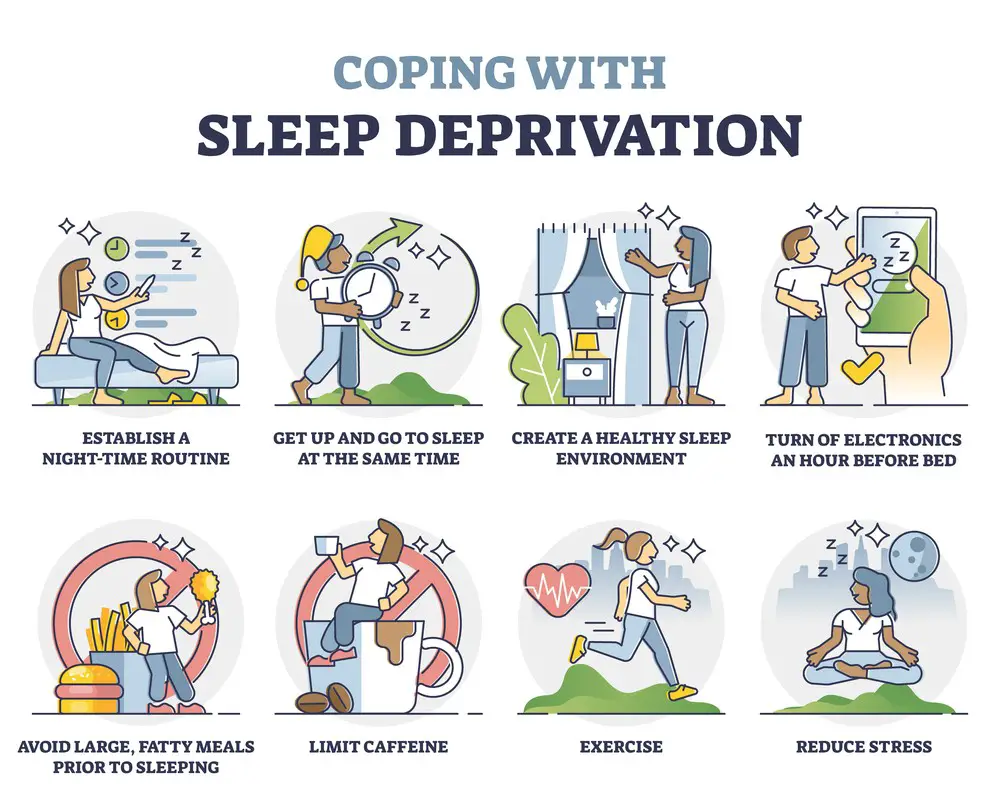 Creating a bedtime ritual can be your ticket to the serene realms of deep sleep. Engage in relaxation techniques like meditation or gentle stretching before bed, setting the stage for quality sleep.
Creating a bedtime ritual can be your ticket to the serene realms of deep sleep. Engage in relaxation techniques like meditation or gentle stretching before bed, setting the stage for quality sleep.
Keep gadgets out of reach; their blue light casts away drowsiness and keeps your brain alert when rest is due. Make sure your bedroom is a sanctuary for slumber: cool, dark, and quiet help usher in optimal sleep conditions.
Stick to a consistent sleep pattern even on weekends to reinforce your body’s natural sleep-wake cycle. Managing stress through regular exercise, talking with friends, or journaling promotes good sleep hygiene.
Such effective bedtime practices signal to your mind that it’s time to wind down. Let’s look at healthy lifestyle habits enhancing our journey toward sufficient rest.
Adopting Healthy Lifestyle Habits
 After honing sleep hygiene, integrating healthy lifestyle habits can further enhance deep sleep quality. Starting with physical activity, regular exercise boosts overall health and primes the body for restorative sleep.
After honing sleep hygiene, integrating healthy lifestyle habits can further enhance deep sleep quality. Starting with physical activity, regular exercise boosts overall health and primes the body for restorative sleep.
Aim for at least 30 minutes of moderate aerobic activity most days—just be sure to wrap up any vigorous workouts a few hours before bedtime to avoid being too energized when it’s time to wind down.
In addition to moving your body, managing stress through relaxation techniques plays a crucial role in achieving sound slumber. Consider incorporating mindfulness or breathing exercises into your routine to calm the mind and prepare for sleep.
Mindful eating is also crucial; opt for balanced meals that nourish the body close to bedtime without overstimulating it. Keep caffeinated beverages earlier in the day since caffeine can disrupt your natural sleep cycle.
Lastly, comfortable bedding ensures your body has the perfect cocoon for slipping into deep, uninterrupted dreams each night.
How Much REM Sleep Should I Get?
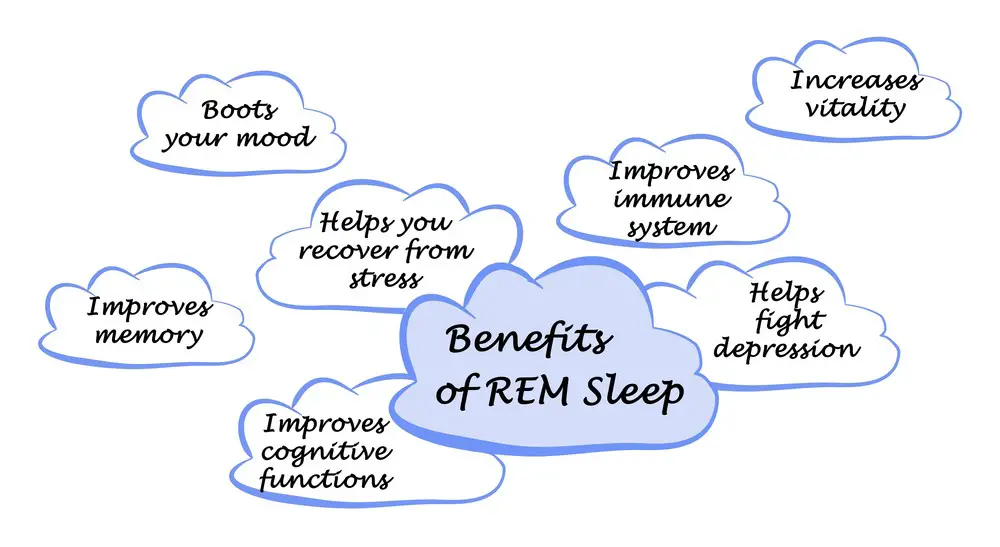 Sleep that involves rapid eye movement, or REM, is linked to vivid dreams and is essential for maintaining mental and emotional well-being. The significance of REM sleep and the optimal amount to strive for can substantially impact emotional control, cognitive performance, and general well-being.
Sleep that involves rapid eye movement, or REM, is linked to vivid dreams and is essential for maintaining mental and emotional well-being. The significance of REM sleep and the optimal amount to strive for can substantially impact emotional control, cognitive performance, and general well-being.
The Role of REM Sleep
REM sleep is characterized by fast, random eye movements, increased brain activity, and muscle atonia, preventing you from acting out your dreams. This sleep phase is vital for processing emotions, consolidating memories, and facilitating learning and creativity. Studies have shown that REM sleep enhances neural connections, which are essential for learning new information and problem-solving skills.
Recommended REM Sleep Duration
The amount of REM sleep an individual needs can vary, but it generally makes up about 20-25% of an adult’s total sleep cycle, equating to approximately 90-120 minutes per night. For children and adolescents who require more sleep overall, the proportion of REM sleep can be higher, emphasizing its role in development and brain maturation.
The research underscores the importance of REM sleep in emotional and psychological health. A study published in the Journal of Neuroscience highlights the role of REM sleep in emotional regulation, suggesting that adequate REM sleep contributes to better coping strategies and emotional resilience.
Another study links REM sleep deficiencies to decreased cognitive function and memory issues, underlining the necessity of achieving sufficient REM sleep for mental clarity and memory consolidation.
Maximizing REM Sleep
To increase REM sleep, experts recommend establishing a consistent sleep schedule, reducing alcohol and caffeine intake, especially in the hours leading up to bedtime, and creating a comfortable, sleep-conducive environment.
Stress-reducing activities like meditation or gentle yoga before bed can promote longer, uninterrupted REM sleep phases.
Understanding the pivotal role of REM sleep in our health and striving to optimize its duration in our sleep cycle can significantly improve mental acuity, emotional stability, and overall quality of life.
Prioritizing REM sleep, alongside deep sleep, is a critical component of a holistic approach to restorative rest.
What Causes Lack of Deep Sleep?
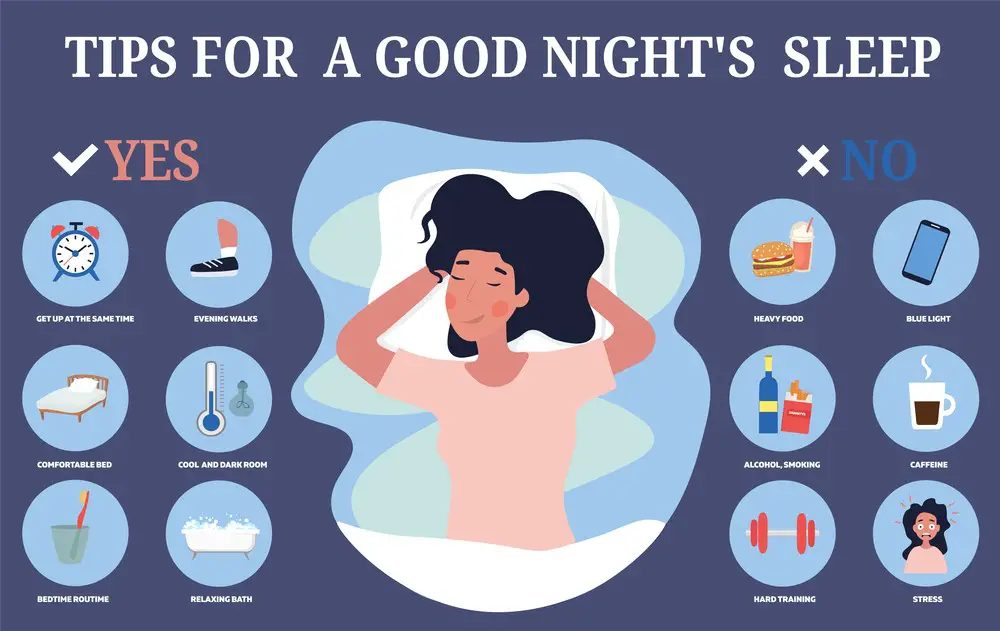 Moving from understanding REM sleep, let’s explore factors that disrupt deep sleep. Stress and anxiety often play a significant role, leading to restless nights where profound sleep feels out of reach.
Moving from understanding REM sleep, let’s explore factors that disrupt deep sleep. Stress and anxiety often play a significant role, leading to restless nights where profound sleep feels out of reach.
Environmental noise or extreme temperatures in the bedroom can also disturb your slumber, preventing you from sinking into those deeper stages of rest.
Certain medications might interfere with your ability to achieve deep sleep, along with varying shift work schedules that confuse your body’s internal clock. Additionally, poor bedtime routines—like using electronic devices right before trying to sleep—can keep your mind too stimulated for relaxation.
Regular exercise is great, but doing it too close to bedtime can leave you awake when you should be experiencing rejuvenating deep sleep.
Sleep Disorders Associated With Lack Of Deep Sleep
Getting quality sleep is critical for both physical and mental health. However, many people suffer from sleep disorders that prevent them from reaching the deep, restorative stages of non-REM sleep necessary to function correctly.
Two of the most common issues caused by lack of deep sleep are insomnia and sleep apnea.
Insomnia makes it hard to fall or stay asleep. Acute insomnia is brief and often tied to stress, while chronic insomnia persists over time regardless of the initial cause. Since deep sleep comes early at night, those with insomnia miss this vital phase.
Effects of insomnia include low energy, brain fog, poor concentration, irritability, weakened immunity, and even depression or anxiety in severe cases.
Sleep apnea causes pauses or decreases breathing over 10 seconds, reducing oxygen levels.
Since breathing abnormalities happen most during REM cycles later at night, early deep sleep stages may not be impacted. However, constantly awakening to breathe prevents continuous, quality sleep. If untreated, sleep apnea increases your risk for other conditions like heart disease or diabetes.
While insomnia may allow some deep sleep and sleep apnea generally impacts later REM cycles, both disorders can make you feel unrested. Getting a formal diagnosis can help determine appropriate treatment options. Sleep studies monitor brain waves, oxygen levels, heart rate, and breathing patterns to identify issues preventing the deeper non-REM stages.
Treating the root cause is the priority, but improving sleep hygiene by sticking to regular sleep-wake times, limiting blue light exposure at night, avoiding large meals before bed, and creating cooler, calmer sleeping environments also help reset normal cycles to reach restorative sleep.
How Long Should You Be in Deep Sleep?
Most adults need deep sleep for about one to two hours each night. This restorative sleep stage helps the brain and body recover from the day’s activities. Getting enough deep sleep is crucial, as it plays a role in memory consolidation and physical health maintenance.
Typically, you enter your deepest sleep during longer sleep cycles later at night.
Determining how much deep sleep each person needs can be challenging since individual requirements vary based on age, lifestyle, and overall health. It’s essential to listen to your body and assess how you feel during the day to gauge if you’re getting sufficient quality rest in all stages of non-REM and REM sleep— after all, both are important for optimal functioning.
Transitioning smoothly into “What Percentage of Sleep Should Be Deep?” let’s explore what a balanced sleep cycle looks like for most people.
What Percentage of Sleep Should Be Deep?
Transitioning from the duration of deep sleep, let’s focus on what portion of our slumber should be dedicated to this vital stage. Aim for a sweet spot where deep sleep makes up roughly 20% of your nightly rest.
This is when your body repairs tissues and strengthens its immune system. It’s also crucial for memory consolidation, so ensuring you hit that 20% can lead to better cognitive function.
Deep sleep generates delta waves, which are essential for mental and physical health. Adults should strive for this stage to constitute 10% to 25% of their sleep cycle. Achieving this percentage allows the brain to rejuvenate, preparing you for a day filled with challenges and learning new information.
Remember that individual needs may vary, but sticking within these guidelines typically ensures a balanced rest cycle.
REM vs. Core vs. Deep Sleep
Understanding the distinctions between REM sleep, core sleep, and deep sleep is crucial for comprehending how each contributes to overall health and well-being. While these phases are interconnected, they serve unique functions within the sleep cycle.
REM Sleep
REM sleep is most associated with dreaming, brain activity, and memory consolidation. It’s a phase where the brain processes emotions, solidifies memories, and supports learning. REM sleep is critical for cognitive and emotional health, making up about 20-25% of adult sleep.
Core Sleep
Core sleep refers to the portion of sleep essential for basic functioning, primarily encompassing deep sleep but also including the necessary stages leading into it. During core sleep, the body performs most of its physical repair and recovery, such as tissue growth and immune system strengthening. This phase is vital for physical health and healing.
Deep Sleep
Deep sleep, or slow-wave sleep, is a segment of core sleep characterized by the slowest brain waves during the sleep cycle. It plays a significant role in physical restoration, energy replenishment, and brain detoxification. Deep sleep is fundamental for physical recovery and growth hormone release.
Each sleep phase plays a distinct role in maintaining health, with REM sleep focusing on mental and emotional restoration and core and deep sleep emphasizing physical recovery. Balancing these stages is key to achieving restorative sleep and optimizing overall well-being.
Navigating Nighttime: When to Worry About Your Deep Sleep
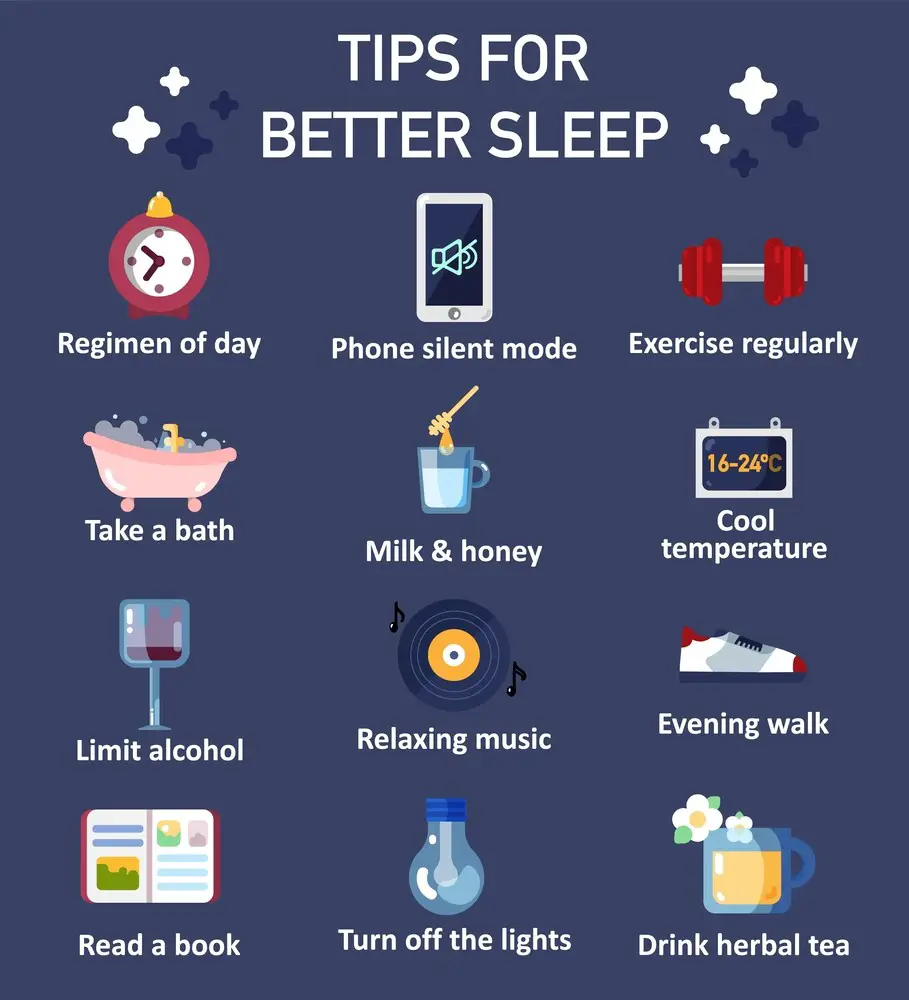 After diving deep into the essentials of deep sleep, you might wonder how to tell if your sleep patterns are a cause for concern. It’s crucial to recognize the signs that indicate a significant issue with your sleep quality, especially when it comes to deep sleep. Here’s what to watch for and when it might be time to seek professional advice.
After diving deep into the essentials of deep sleep, you might wonder how to tell if your sleep patterns are a cause for concern. It’s crucial to recognize the signs that indicate a significant issue with your sleep quality, especially when it comes to deep sleep. Here’s what to watch for and when it might be time to seek professional advice.
Recognizing Red Flags:
- Consistent Difficulty Falling or Staying Asleep: Occasional restlessness is normal, but ongoing struggles to drift off or stay asleep can indicate underlying issues.
- Frequent Nighttime Awakenings: Waking up several times during the night can severely disrupt your sleep, affecting your overall health.
- Daytime Fatigue and Irritability: Feeling exhausted, moody, or unable to concentrate during the day can be signs of insufficient restorative sleep.
- Loud Snoring or Breathing Issues at Night: These can be sleep apnea symptoms, a condition that interrupts deep sleep and can have serious health implications.
- Lack of Refreshment after a Full Night’s Sleep: If you regularly get 7-9 hours of sleep but still feel tired, your deep sleep stage might be compromised.
Taking Action: If you’re experiencing one or more of these signs consistently, it might be time to delve deeper. Here’s what you can do:
- Keep a Sleep Diary: Track your sleep patterns, noting when you go to bed, wake up, and any nighttime awakenings. This can help identify patterns or behaviors that may be affecting your sleep.
- Practice Good Sleep Hygiene: Stick to a regular sleep schedule, create a restful environment, and avoid stimulants like caffeine close to bedtime. These habits can significantly improve your sleep quality.
- Consult a Sleep Specialist: If your sleep issues persist, seeking advice from a healthcare provider or a sleep specialist is crucial. They can offer tailored advice and suggest a sleep study to get to the root of the problem.
Embracing Healthy Sleep: Remember, deep sleep is crucial for physical restoration, emotional regulation, and overall health. Taking steps to improve your sleep can profoundly impact your quality of life. Don’t hesitate to seek help if needed; sometimes, the key to better sleep is understanding and addressing the underlying issues.
Conclusion: The Journey to Restorative Rest
Understanding the intricate dance of deep sleep, REM sleep, and core sleep is just the beginning. Recognizing when your body isn’t getting the rest it needs and taking proactive steps to address it can transform your health and well-being. Listen to your body, prioritize your sleep, and remember that seeking help is okay if you need it. Here’s to finding your path to peaceful, refreshing nights.
- Stress Management: What is the Relationship Between Stress and Addiction? - June 28, 2024
- Exploring Techniques to Maintain a Healthy Lifestyle without Drugs - May 28, 2024
- How Acupuncture Helps Treat Chronic Fatigue Syndrome - May 28, 2024
This site contains affiliate links to products. We will receive a commission for purchases made through these links.




